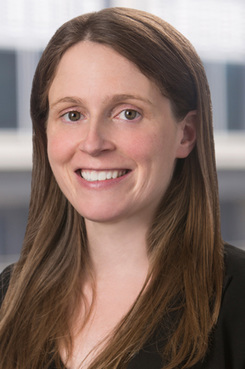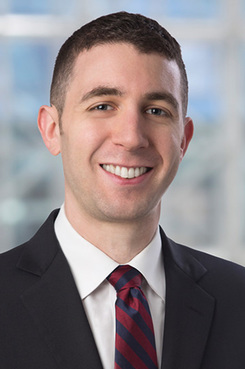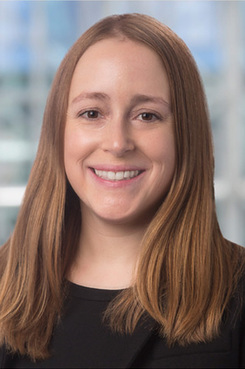Neal Katyal Wants to Train Next Generation of Supreme Court Advocates
Former high court clerks at Hogan Lovells bring the credentials, and Katyal supplies the opportunity to make an early mark.
July 17, 2019 at 05:23 PM
6 minute read
 Neal Katyal, partner with Hogan Lovells in Washington, D.C. Oct. 30, 2017. Photo: Diego M. Radzinschi/ALM
Neal Katyal, partner with Hogan Lovells in Washington, D.C. Oct. 30, 2017. Photo: Diego M. Radzinschi/ALM
For former acting U.S. Solicitor General Neal Katyal, elevating the next crop of Supreme Court advocates at Hogan Lovells starts with getting them deeply involved in high court matters early in their firm careers.
Hogan Lovells scored two U.S. Supreme Court victories in cases argued by Katyal in the court's last term: McDonough v. Smith, a case about when government officials can be sued for fabricating criminal evidence, and Maryland-National Capital Park and Planning Commission v. American Humanist Association, the so-called “peace cross” case regarding a World War I memorial in the shape of a Christian cross on public land in Maryland.
As co-leader of his firm's appellate practice, Katyal is quick to praise his younger Hogan Lovells colleagues in those cases, including newly promoted partner Colleen Roh Sinzdak and senior associates Mitchell Reich, Thomas Schmidt and Katie Wellington.
Katyal called the four “crazy credentialed” and diverse, citing their varied politics, gender, orientations, “and just the experience that they've had.”
 Colleen Roh Sinzdak, Hogan Lovells
Colleen Roh Sinzdak, Hogan LovellsStill, all four attorneys attended Harvard Law School or Yale Law School and all were Supreme Court clerks. Reich clerked for Supreme Court Justice Elena Kagan, Schmidt clerked for Justice Stephen Breyer, and Sinzdak and Wellington both clerked for Chief Justice John Roberts Jr. Wellington also clerked for then-Judge Brett Kavanaugh on the U.S. Court of Appeals for the D.C. Circuit.
“It's like having Supreme Court justices on call,” Sinzdak said of the group's expertise. “You can always call Tom, call Mitch, call Katie, and say, like, 'I have this knotty question, can you help me?' and you're dealing with these brilliant people.”
Katyal said he looked for Supreme Court clerks with high emotional intelligence. The firm, he said, sought to empower a younger lawyer in each of the cases it has moving to the Supreme Court, including next term, when Reich is set to deliver his first-ever Supreme Court argument in Rodriguez v. Federal Deposit Insurance.
 Mitchell Reich, Hogan Lovells
Mitchell Reich, Hogan Lovells“I didn't have this [view] before I was in the solicitor general's office,” Katyal said. “I generally had this view that a group of people will yield a better product … but I actually have come to the view that you give a young associate like these folks who have all of the challenge and brain power and diligence and you say, “You're running this thing,” and by concentrating responsibility it really yields not just a better product but it also is the best way to train someone.”
Katyal “really wants to help folks get their foot in the door,” Reich said in an interview. “Neal has been incredible about putting junior folks forward to do these arguments. He helped me argue part of the [Trump administration] travel ban in the Ninth Circuit.”
Knowledge of the Supreme Court's inner-workings is critical to informing Hogan Lovells' approach to individual cases. Not content to aim for a 5-4 majority along ideological lines at the high court, Reich said the team deliberately targeted the court's liberal bloc in the Maryland peace cross case to ensure a large majority in support of their argument.
“Neal clerked for Justice Breyer, I clerked for Justice Kagan, and so we know their jurisprudence really well, and we thought that this was a case where we could actually get two of the more liberal-leaning justices to side with a majority of the court in upholding a cross like this,” Reich said. “From the beginning that was our strategy: These are justices who care a lot about not disturbing long-standing traditions and monuments that have been around for a long time.”
 Katie Wellington, Hogan Lovells
Katie Wellington, Hogan LovellsIn the end, the court voted 7-2, with Justice Ruth Bader Ginsburg and Sotomayor dissenting.
The competition to hire former clerks is extraordinary. Jones Day, for example, routinely strives to hire them in large numbers, and in 2015 the firm recruited 10 of the 39 clerks working for the justices in the previous term.
Supreme Court rules forbid former clerks from participating in cases before the court for two years after their employment there ends. But that hasn't dampened the market for them. The Big Law hiring bonus for clerks reached $400,000 last year and is climbing higher year after year.
At Hogan Lovells, young former clerks are playing key roles in the firm's cases both before the justices and behind the scenes. When the Supreme Court grants a case, advocates have the opportunity to meet with the U.S. solicitor general's office and urge the government to back their client's position, or at least avoid siding against them. Schmidt met with the SG's office in the McDonough case, and the government subsequently elected to argue for his side as amicus curiae.
Sinzdak, who made partner earlier this year, argued before the Supreme Court in Fort Bend County, Texas v. Davis soon after her promotion. The court rejected Hogan Lovells' position, but Sinzdak said it was a “pretty special” experience that was an example of what set the firm apart from others.
It comes back to Katyal's conviction that placing real responsibility on a new generation of Supreme Court lawyers is the right approach for clients, the firm and the bar—and that turning to associates for legal research isn't enough.
“It's interacting with the amicus, interacting with the clients, running the moots, asking the hard questions, all of that,” he said.
Read More
Who Gets the Golden Ticket? SCOTUS Clerks and Diversity
$400K for SCOTUS Clerks: A Bonus Too Far?
How Jones Day Cornered the Market on SCOTUS Clerks
Marcia Coyle contributed reporting from Washington.
This content has been archived. It is available through our partners, LexisNexis® and Bloomberg Law.
To view this content, please continue to their sites.
Not a Lexis Subscriber?
Subscribe Now
Not a Bloomberg Law Subscriber?
Subscribe Now
NOT FOR REPRINT
© 2025 ALM Global, LLC, All Rights Reserved. Request academic re-use from www.copyright.com. All other uses, submit a request to [email protected]. For more information visit Asset & Logo Licensing.
You Might Like
View All
Three Akin Sports Lawyers Jump to Employment Firm Littler Mendelson

Brownstein Adds Former Interior Secretary, Offering 'Strategic Counsel' During New Trump Term
2 minute read
Weil, Loading Up on More Regulatory Talent, Adds SEC Asset Management Co-Chief
3 minute readTrending Stories
- 1'Didn't Notice Patient Wasn't Breathing': $13.7M Verdict Against Anesthesiologists
- 2'Astronomical' Interest Rates: $1B Settlement to Resolve Allegations of 'Predatory' Lending Cancels $534M in Small-Business Debts
- 3Senator Plans to Reintroduce Bill to Split 9th Circuit
- 4Law Firms Converge to Defend HIPAA Regulation
- 5Judge Denies Retrial Bid by Ex-U.S. Sen. Menendez Over Evidentiary Error
Who Got The Work
J. Brugh Lower of Gibbons has entered an appearance for industrial equipment supplier Devco Corporation in a pending trademark infringement lawsuit. The suit, accusing the defendant of selling knock-off Graco products, was filed Dec. 18 in New Jersey District Court by Rivkin Radler on behalf of Graco Inc. and Graco Minnesota. The case, assigned to U.S. District Judge Zahid N. Quraishi, is 3:24-cv-11294, Graco Inc. et al v. Devco Corporation.
Who Got The Work
Rebecca Maller-Stein and Kent A. Yalowitz of Arnold & Porter Kaye Scholer have entered their appearances for Hanaco Venture Capital and its executives, Lior Prosor and David Frankel, in a pending securities lawsuit. The action, filed on Dec. 24 in New York Southern District Court by Zell, Aron & Co. on behalf of Goldeneye Advisors, accuses the defendants of negligently and fraudulently managing the plaintiff's $1 million investment. The case, assigned to U.S. District Judge Vernon S. Broderick, is 1:24-cv-09918, Goldeneye Advisors, LLC v. Hanaco Venture Capital, Ltd. et al.
Who Got The Work
Attorneys from A&O Shearman has stepped in as defense counsel for Toronto-Dominion Bank and other defendants in a pending securities class action. The suit, filed Dec. 11 in New York Southern District Court by Bleichmar Fonti & Auld, accuses the defendants of concealing the bank's 'pervasive' deficiencies in regards to its compliance with the Bank Secrecy Act and the quality of its anti-money laundering controls. The case, assigned to U.S. District Judge Arun Subramanian, is 1:24-cv-09445, Gonzalez v. The Toronto-Dominion Bank et al.
Who Got The Work
Crown Castle International, a Pennsylvania company providing shared communications infrastructure, has turned to Luke D. Wolf of Gordon Rees Scully Mansukhani to fend off a pending breach-of-contract lawsuit. The court action, filed Nov. 25 in Michigan Eastern District Court by Hooper Hathaway PC on behalf of The Town Residences LLC, accuses Crown Castle of failing to transfer approximately $30,000 in utility payments from T-Mobile in breach of a roof-top lease and assignment agreement. The case, assigned to U.S. District Judge Susan K. Declercq, is 2:24-cv-13131, The Town Residences LLC v. T-Mobile US, Inc. et al.
Who Got The Work
Wilfred P. Coronato and Daniel M. Schwartz of McCarter & English have stepped in as defense counsel to Electrolux Home Products Inc. in a pending product liability lawsuit. The court action, filed Nov. 26 in New York Eastern District Court by Poulos Lopiccolo PC and Nagel Rice LLP on behalf of David Stern, alleges that the defendant's refrigerators’ drawers and shelving repeatedly break and fall apart within months after purchase. The case, assigned to U.S. District Judge Joan M. Azrack, is 2:24-cv-08204, Stern v. Electrolux Home Products, Inc.











